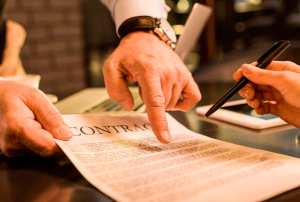Setting up a restaurant requires a lot of work: preparing the food, serving the tables or keeping the premises clean are just some of the daily tasks that the entrepreneur has to attend to and that can be altered by incidents that may affect the establishment.
And, in the worst cases, to their customers. A good insurance guarantees that no mishap hinders the productivity of your business.
Insurance for restaurants: Civil Liability
Restaurant insurance generally includes Civil Liability coverage, essential in a business to repair or indemnify for damages caused to a third party in the course of the hospitality activity, such as falls due to slipping, falling structures or hitting objects suspended.
Product Liability coverage is especially relevant, to insure damages caused by food products produced in the restaurant, such as food poisoning due to poor preparation or preservation of products.

It is also interesting to have Employer Civil Liability coverage, to cover the damages for which employers are responsible for accidents that their employees may suffer (falls, burns, etc.).
As well as a Business Exploitation Civil Liability, which not only covers damage to customers.
But also to any person who comes to the restaurant, such as product suppliers or commercial representatives.
What are the usual risks in a Restaurant?
Water damage is the main risk to which restaurants are subjected, accounting for almost a quarter of the claims. Behind them are thefts and glass breaks, as well as damage caused by atmospheric phenomena.
Although fires are infrequent, they are also considerable risks in restaurants since the consequences they can cause are enormous.
What coverage does restaurant insurance have?
The most common toppings that a restaurant should have are:
- Fires, to cover damage caused by fire to property, furniture or merchandise.
- Explosion or implosion, to compensate for property damage caused by these mishaps.
- Lightning strikes and other natural phenomena, such as torrential rains, hail or strong winds.
- Damages due to water and floods, due to broken pipes, water leaks, leaks…
- Glass breaks, which cover broken windows, shop windows, signs, screens, etc.
- Electrical damage, due to damage to electrical installations that cause surges or short circuits, among others.
- Theft, for material damage suffered and that allows the repair of doors, windows, locks and shop windows, and may also include theft of cash from the cash register or from customers.
- Loss of merchandise, to cover food stored in cold rooms that spoil due to electrical failures or machinery breakdowns.
- Infidelity of employees, to receive compensation for losses caused by an employee, such as internal theft.
- Loss of income, due to the stoppage of the activity due to an accident.

Types of Insurance for Restaurants
The insurance that a restaurant requires is determined by the type of activity they carry out, which is basically the service of meals prepared for consumption at the moment.
Either in the dining rooms of the premises or on request to pick up or take home. However, there are also differences whether or not the establishment has a bar, as well as a terrace.
The coverage must respond to the available capacity depending on the meters that the establishment has and if complementary performances or shows are held in the premises.
It is the Autonomous Communities that establish the capital that must be covered based on the maximum number of people that can be inside the establishment, since all of them can be affected at any given time by an accident, such as a fire that forces eviction.
All these elements, together with the location, the size of the premises, the number of employees in charge or the security measures available, are essential to determine the cost of insuring the business.
Who needs this Insurance?
Any person who is going to carry out a commercial activity, as in the case of restaurants, is obliged to take out Civil Liability insurance, regulated in article 1902 of the Civil Code: “Anyone who by action or omission causes damage to another, intervening fault or negligence, is obliged to repair the damage caused.

In addition, if a restaurant is going to be set up in premises rented from a third party, it is interesting to take out Rental Civil Liability coverage because it covers the employer who has rented the premises against the owner of the premises, for the damages he may suffer, as in cases of fire or explosion.
Final Words
In general, it can be said that there are three types of insurance that are essential for any restaurant:
- Civil Liability, because during the development of their work damages can be caused to third parties (physical damage, material damage or economic losses) that can lead to significant compensation and expenses.
- Multi-risk Commerce, to protect the entrepreneur’s assets against damages that, although they do not affect third parties, may lead to significant losses, such as floods or fires.
- Accident Agreement, which indemnifies workers for accidents at work in the event of death or disability.